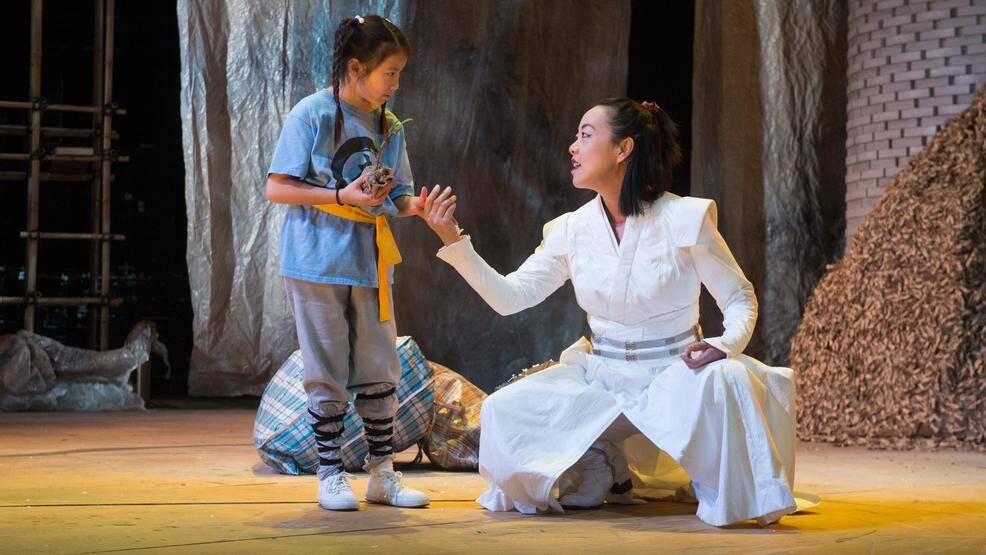As befits a masterpiece, ‘Snow’ can be difficult

Frances Ya-Chu Cowhig’s “Snow in Midsummer” is a masterpiece.
That’s not surprising. Cowhig, an internationally based playwright whose work has been staged on the West End, the Goodman Theatre, and at the Royal Shakespeare Company, among others, is a preeminent and glowing presence on the Wendy Wasserstein/Yale Rep/Eastern Establishment circuit, with multiple awards and is a strong and distinctive voice for playwrights everywhere and for female playwrights in particular.
“Snow in Midsummer” is riddled with examples of strong women in positions of influence. From young children with psychic abilities (as represented in this play by the unnervingly talented child actor, Olivia Pham) to the ghost of a wronged women who are irretrievably miffed about the scopious effects of misogyny and male power (Jessica Ko, in what is surely a defining moment for her acting career) to career women who, despite their financial and intellectual capabilities, are forced to capitulate, economically and otherwise, to a posse of far less capable male functionaries who gain their strength at a state level (Amy Kim Waschke, who is fantastic as “Boss” Lin), the play is a cornucopia of feminist potency. It’s also a quantifiable deterrent to anyone who has ever denied the capacity for fury that can be mustered up from the belly of a woman scorned.
A warning, then. “Snow in Midsummer,” while certainly brilliant, is not for the faint of heart. There are genuinely terrifying moments, of the sort that are all too rare in the theater — moments that genuinely raise gooseflesh and cause sickness in the stomach. It’s a bloody, no-holds-barred, harrowing classic, filled with horror, executions, risen ghosts and complex themes that are rooted in ownership of the body and the consequences of throwing ones form onto the bone-grinding gears, wheels and levers of the fascist state. Brains and guts are spilled, hearts are literally extracted and, unless you’re budgeting for a therapist, it’s probably wise to leave the kids at the hotel for this one.
Much of the potency of this brilliant opus has likely originated from whence it was sourced, an early Chinese play entitled “The Injustice to Dou Yi That Moved Heaven and Earth” by Guan Hanqing — a work that emerged during the early 14th century. The intensity of the era, which was ruled over by the Yuan dynasty (itself founded by Kubla Khan, the legendary protagonist of Coleridge’s “Xanadu”), has been expertly woven into the writing and heavily influences the play, which seems to be intensified to the point of emotional distress as a combined result of Cowhig’s genius and the feudal context from which she draws her material.
The eeriness of the experience has much to do with the sense of ancientness that is inherent to the action. The play reached out across centuries of history and presses its cold hand into the body of the audience. I can’t remember a time when I was more affected by a production.
Extraordinary acting from those already mentioned, as well as from Will Dao, Monique Holt, Cristofer Jean, Natusoko Ohama, James Ryen, Daisuke Tsuji, Moses Villarama and Roman Zaragoza — all robustly talented members of Actors Equity — makes for an almost totally fulfilling evening of theater, provided you have the stomach for legitimately alarming performance and imagery. Gird your loins and go — “Snow in Midsummer” is savage, and scintillating, and worth it.
“Snow in Midsummer” plays at the Angus Bowmer Theatre of the Oregon Shakespeare Festival, 15 South Pioneer St. in Ashland, through Oct. 27.

Comments are closed.